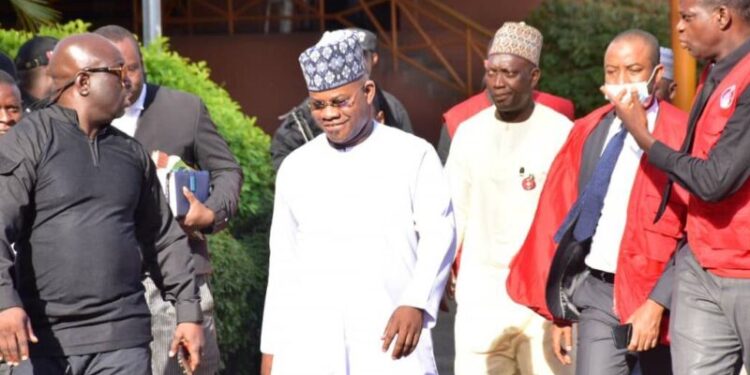A Federal Capital Territory High Court on Thursday, admitted the immediate past Governor of Kogi, Yahaya Bello, to bail in the sum of N500 million with three sureties in like sum.
Justice Maryann Anenih had, on Dec. 10, refused the ex-governor’s bail application, saying it was filed prematurely.
While delivering the initial ruling, she said, having been filed when the 1st defendant was neither in custody nor before the court, the instant application was incompetent.
There was, however room for the governor’s lawyers to file a fresh application for bail and apply for hearing date.
The former governor is facing an alleged money laundering trial to the tune of N110bn, along with two others.
He had pleaded not guilty to the 16-count charges brought against him by the Economic and Financial Crimes Commission.
At the resumed hearing on Thursday , Counsel for the former governor, Joseph Daudu, SAN, informed the court that the defence counsels had filed a further affidavit in response to the counter affidavit filed and served by the prosecution counsels.
He applied to withdraw the further affidavit, saying, “we do not want to make the matter contentious.”
There was no objection from the prosecution counsel, Olukayode Enitan, SAN. The court, therefore, granted the application for withdrawal, striking out the further affidavit.
Daudu, also informed the court that discussions had taken place with the leader of the prosecution counsels, resulting in an agreement to ensure a speedy trial.
In light of this understanding, Daudu urged the court to grant the bail application.
He further requested that if the court would graciously grant the Defendant bail, the court should kindly review the bail conditions for the 1st, 2nd, and 3rd defendants.
He urged the court to broaden the scope of properties to be used as bail sureties to include locations across the Federal Capital Territory (FCT), rather than limiting the location solely to Maitama.
The prosecution counsel, Enitan SAN, acknowledged that Daudu SAN had been in talks with the prosecution team.
In accordance with the Rules of Professional Conduct (RPC), the EFCC Counsel gave assurance of their cooperation in expediting the trial.
He said, “I confirm the evidence given by the distinguished member of the bar that is leading the Defence, J.B. Daudu, SAN, that he has been in conversation with the leader of the prosecuting team.
“In the legal tradition, we should cooperate with members of the bar when it does not affect the course of justice.
“We have decided not to make this contentious, bearing in mind that no matter how industrious the defence counsel might be in pushing forward the application for bail and no matter how vociferous the prosecution counsel can argue against the bail application, your lordship is bound by your discretion to grant or not to grant the application.
“We are therefore leaving this to your lordship’s discretion.”
Delivering her ruling, Justice Anenih acknowledged that the offence the 1st Defendant was charged with was a bailable one and granted the ex-governor bail in the sum of N500 million, with three sureties in like sum.
The sureties must be notable Nigerians with landed property in Maitama, Jabi, Utako, Apo, Guzape, Garki and Asokoro.
Bello was also asked to deposit his international passport and other travel documents with the court.
He is to remain in Kuje Correctional Centre until the bail conditions are met.(NAN)
Details later…











